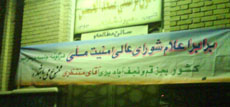Tuesday, August 24, 2010
|
Home
>
Radio Zamaneh in English
>
Latest News
>
Ayatollah Montazeri's services banned by Iranian authorities
|
Ayatollah Montazeri's services banned by Iranian authorities

banner at Al-Hosein Mosque in Kashan
Iranian authorities have banned all memorial services for the dissident cleric, Grand Ayatollah Montazeri with the exception of those in Najafabad, the hometown of the deceased religious leader and the shrine city of Qom where Ayatollah Montazeri was living when he passed away.
The reformist website, Parleman News reports that last night’s scheduled memorial service in Kashan was cancelled by the security forces and a banner indicating the ban by the order of the National Security Supreme Council was installed on the entrance of Al-Hosein Mosque.
The customary memorial services for the third and seventh day of the Grand Ayatollah’s death were also cancelled, according to Parleman News.
The death of Ayatollah Hoseinali Montazeri, the outspoken critic of the Islamic Republic, on Sunday, triggered a deep expression of mourning amongst Iranians who were already involved in over six months of protests against the alleged vote fraud which brought Mahmoud Ahmadinejad back to power.
Mondays’ funeral which was attended by hundreds of thousands of mourners was turned into an anti-establishment protest with slogans chanted against the Supreme Leader, Ayatollah Khamenei.
Ayatollah Taheri’s memorial service in Esfahan was also cancelled yesterday and the cleric was forcefully impeded from attending the mosque at the scheduled hour.
Mourners in Esfahan were dispersed using tear bombs, batons and clubs and reportedly over 50 people were arrested yesterday.
This spread of anti-establishment sentiments beyond the usual borders of dissent in Tehran has alarmed the Islamic Republic; hence, the decision to ban all memorial services for Ayatollah Montazeri.
Ayatollah Montazeri, one of the highest Shiite authorities, despite being a leading figure in the 1979 Revolution of Iran and instrumental in the founding of the Islamic Republic, parted ways from the establishment over the mass execution of dissidents in 1990.
He was put under house arrest for his criticism of the Supreme Leader Ayatollah Khamenei and became one of the leading figures of the reform movement in Iran.
In the past six months, he openly condemned the government's violent crackdown on election protesters.
Further protests are expected on the weekend as the early days of the dissident cleric's death coincides with Ashura and Tasoua, days that Shiites customarily show grand gestures of mourning on the streets of the country for the death of the third Shiite Imam in the Holy month of Muharram.
|
|

